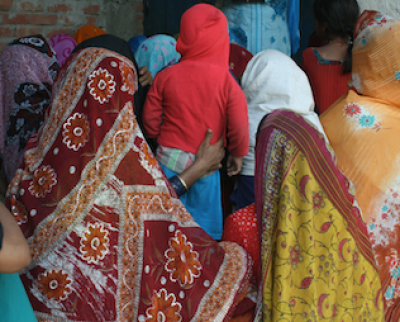Testing a community based intervention to reduce neonatal deaths in rural Ghana: Newborn Home Intervention Study (Newhints)
Newhints is a cluster randomised trial to evaluate the impact of routine home visits by community volunteers on neonatal mortality in rural Ghana.
The trial is being conducted in 6 contiguous districts in the Brong Ahafo Region of Ghana. The study area has a total population of approximately 600,000, with more than 100,000 women of reproductive age and15, 000 births a year.
The Newhints intervention was developed over a 2 year period in close collaboration with the 6 District Health Management Teams and relevant national programme coordinators.
The core component of the Newhints intervention is to train the current network of community based surveillance volunteers (CBSVs) to identify pregnant women in the community and to conduct two home visits during pregnancy and three in the first week of life of the neonate to address essential maternal and neonatal care practices, and to assess and refer sick babies.
Newhints also involves strengthening of the DHMTs including developing a sustainable supervisory and remuneration structure for the CBSVs and several supportive activities including improving skills in newborn care in the district hospitals and sensitisation activities with health facility staff, traditional birth attendants and communities.
Publications
Effect of the Newhints home-visits intervention on neonatal mortality rate and care practices in Ghana: a cluster randomised controlled trial.
Kirkwood BR, Manu A, ten Asbroek AH, Soremekun S, Weobong B, Gyan T, Danso S, Amenga-Etego S, Tawiah-Agyemang C, Owusu-Agyei S, Hill Z.Lancet. Jun 22;381(9884):2184-92.2013
Quality of newborn care: a health facility assessment in rural Ghana using survey, vignette and surveillance data. Vesel L, Manu A, Lohela TJ, Gabrysch S, Okyere E, Ten Asbroek AH, Hill Z, Agyemang CT, Owusu-Agyei S, Kirkwood BR. BMJ Open. May 9;3(5).2013
Promoting skin-to-skin care for low birthweight babies: findings from the Ghana Newhints cluster-randomised trial. Vesel L, ten Asbroek AH, Manu A, Soremekun S, Tawiah Agyemang C, Okyere E, Owusu-Agyei S,Hill Z, Kirkwood BR. Trop Med Int Health. Aug;18(8):952-61.2013
Developing a community-based neonatal care intervention: a health facility assessment to inform intervention design.
Howe L, Manu A, Tawiah-Agyemang C, Kirkwood B and Hill Z.
Paediatric and Perinatal Epidemiology. Mar;25(2):192-200. 2011.
NEWHINTS cluster randomised trial to evaluate the impact on neonatal mortality in rural Ghana of routine home visits to provide a package of essential newborn care interventions in the third trimester of pregnancy and the first week of life: trial protocol.
Kirkwood BR, Manu A, Tawiah-Agyemang C, Ten Asbroek G, Gyan T, Weobong B, Lewandowski RE, Soremekun S, Danso S, Pitt C, Hanson K, Owusu-Agyei S and Hill Z. Trials. May 17;11:58. 2010.
Improving hygiene in home deliveries in rural Ghana: how to build on current attitudes and practices. Hill Z, Tawiah-Agyemang C, Okeyere E, Manu A, Fenty J, and Kirkwood BR. Pediatr Infect Dis J. Nov;29(11):1004-8. 2010.
Newborn care: the effect of a traditional illness, asram, in Ghana.
Okyere E, Tawiah-Agyemang C, Manu A, Deganus S, Kirkwood BR, and Hill Z. Ann Trop Paediatr. 30(4):321-8. 2010.
Keeping newborns warm: beliefs, practices and potential for behaviour change in rural Ghana. Hill Z, Tawiah-Agyemang C, Manu A, Okyere E and Kirkwood BR. Trop Med Int Health. Oct;15(10):1118-24. 2010.
Early initiation of breast-feeding in Ghana: barriers and facilitators
Tawiah-Agyemang C, Kirkwood BR, Edmond K, Bazzano A and Hill Z. J Perinatol (28) Sup2 S46-52. 2008.
How did formative research inform the development of a home-based neonatal care intervention in rural Ghana? Hill Z, Manu A, Tawiah-Agyemang C, Gyan T, Turner K, Weobong B, Ten Asbroek AH and Kirkwood BR. JPerinatol (28) Sup2 S38-45. 2008.
Developing community-based intervention strategies to save newborn lives: lessons learned from formative research in five countries. Neonatal Mortality Formative Research Working Group. J Perinatol. Dec;28 Suppl 2:S2-8. 2008.
 Close
Close


